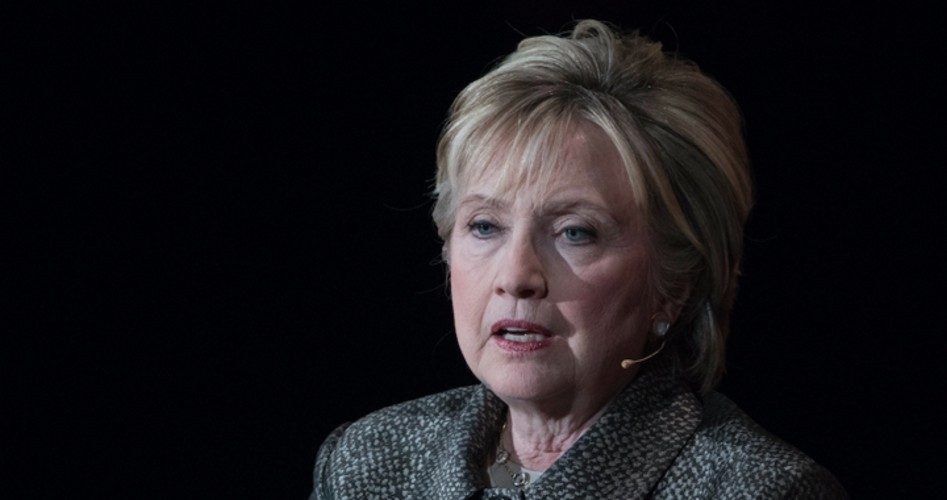
Congressional investigators have turned up new information indicating that high-level FBI officials including ousted director James Comey decided ahead of time to exonerate Hillary Clinton (shown) of doing anything illegal in her use of an unsecured, unauthorized, private e-mail server to send and receive classified e-mails during her tenure as secretary of state. Not only that, but evidence indicates that the FBI buried facts regrading Clinton wrongdoing.
In the myriad investigations now swirling around Hillary Clinton, it is reasonable to ponder which one she should be most concerned about. Yet it would be difficult to imagine one that could do more to damage her than the investigations connected to her use of a private server. After all, not being indicted (yet!) is not the same thing as being found not guilty. Clinton could presumably still be charged, tried, and convicted for the multiplicity of crimes she committed by sending and receiving at least 2,079 classified e-mails over her private server and account. With congressional investigators looking into the matter, it is not beyond the realm of possibility that she may yet have to face charges for her actions.
As The Hill reported last week, a panel made up of “Republicans on three House committees and the Senate Judiciary Committee” have newly uncovered irregularities and contradictions inside the FBI’s probe of Hillary Clinton’s email server.” As that report stated:
For the first time, investigators say they have secured written evidence that the FBI believed there was evidence that some laws were broken when the former secretary of State and her top aides transmitted classified information through her insecure private email server, lawmakers and investigators told The Hill.
That flies in the face of ousted FBI Director James Comey’s statement when he publicly declined to recommend indicting Clinton because “our judgment is that no reasonable prosecutor would bring such a case” since the FBI did not find evidence of “intentional misconduct or indications of disloyalty to the United States or efforts to obstruct justice.” Because sending and receiving at least 2,079 classified e-mails, initially refusing to turn over her server, and then only turning the server over to investigators after having it wiped, and claiming that she had turned over “all work-related” e-mails while actually deleting half as many as she turned over are all apparently, in Comey’s mind, the actions of someone who did not intend to break the law. Right.
Fortunately for the American people and the cause of justice (and unfortunately for Clinton), congressional investigators don’t buy that. And Comey — already summarily dismissed from his position (and none too soon) — may have to answer for his role in protecting Clinton.
As to whether Clinton intended to break the law, two important facts should not be missed: First, her intent is irrelevant; second, she certainly knew she was breaking the law and did so with full intent.
Her intent is irrelevant because the applicable statutes do not allow for ignorance as an excuse; nor should they — national security demands that those responsible for guarding it are held to a very high standard: 18 USC Sec. 1924 criminalizes the unauthorized removal and storage of classified information. Penalties can include fines and imprisonment for up to one year. And while Clinton claimed early on that many of the classified e-mails should not have been classified, she lacked the authority to make that call.
In 2009, President Obama signed Executive Order 13526, which spells out — in uncharacteristically clear language — the process for declassifying intelligence and who has the authority to do so. One part of the order says, “Information shall be declassified or downgraded by … the official who authorized the original classification … [or] the originator’s current successor.” Since other agencies (such as the CIA) classified the intelligence in those e-mails, Clinton could not simply decide it didn’t count.
Furthermore, 18 US Code 793 — which is part of the Espionage Act — says:
(f) Whoever, being entrusted with or having lawful possession or control of any document, writing, code book, signal book, sketch, photograph, photographic negative, blueprint, plan, map, model, instrument, appliance, note, or information, relating to the national defense,
(1) through gross negligence permits the same to be removed from its proper place of custody or delivered to anyone in violation of his trust, or to be lost, stolen, abstracted, or destroyed, or
(2) having knowledge that the same has been illegally removed from its proper place of custody or delivered to anyone in violation of its trust, or lost, or stolen, abstracted, or destroyed, and fails to make prompt report of such loss, theft, abstraction, or destruction to his superior officer —
Shall be fined under this title or imprisoned not more than ten years, or both.
“Gross negligence” does not require intent. Clinton broke a slate of laws designed to protect national security from actions exactly like those she directed and performed. Intent is not the germane issue here.
And — just to put in the for-what-it’s-worth column — Clinton certainly was aware of her responsibilities and the salient fact that her actions were contrary to those responsibilities. In short, the evidence is indisputable that Clinton knew she was breaking the law, and she did so deliberately.
First, there are the two non-disclosure agreements (NDAs) that Clinton signed as part of her employment as secretary of state. As this writer said when the first of those NDAs came to light in November 2015:
The NDA signed by Mrs. Clinton on her second day as secretary of state spells out — in language so clear that the meaning of the word “is” is quite unambiguous — her responsibility in handling the sensitive information to which she would have access in her new job. One part reads, “I have been advised that the unauthorized disclosure, unauthorized retention, or negligent handling of SCI [Sensitive Compartmented Information] by me could cause irreparable injury to the United States or be used to advantage by a foreign nation.” The agreement goes on to address how Secretary Clinton could be sure she was abiding by the letter and the spirit of the agreement. “I understand that it is my responsibility to consult with appropriate management authorities in the Department … in order to ensure that I know whether information or material within my knowledge or control … might be SCI,” the NDA says.
And yet, while the ink of her signature was still wet, Hillary made the decision to re-purpose Bill’s old e-mail server into her own server to be used for official government business. She and her campaign have made much of the fact that she was permitted, by State policy, to operate a private server. Par for the course, though, the fact is conveniently left out that her server was not authorized to contain, store, transmit, or receive classified information.
Besides the NDAs showing that Clinton was well aware of her responsibilities under the law, there is the also fact that an e-mail exchange, dated June 22, 2015 and published by WikiLeaks in October 2016, shows that Clinton’s inner circle didn’t even buy into her claim of ignorance where the e-mail server was concerned. As this writer reported at the time, the e-mail was written by Erika Rottenberg, an attorney with tremendous experience in matters related to the intersection of technology and law. Given her résumé, Rottenberg can safely be assumed to know a thing or two about the law as it relates to the mishandling of information over an unsecured, unauthorized, private e-mail account. The e-mail (addressed to Stephanie Hannon — who is the the chief technical officer of the Clinton Campaign — and Ann O’Leary — who serves as a senior policy advisor for the campaign) addresses the “twisted truth” of the way Clinton claimed she “only used one device” (a BlackBerry) “when 2 weeks earlier, it was an iphone, BB [BlackBerry] and ipad.” But the most damning part of the e-mail is when Rottenberg says:
I know when I talk to my friends who are attorneys we are all struggling with what happened to the emails and aren’t satisfied with answers to date. While we all know of the occasional use of personal email addresses for business, none of my friends circle can understand how it was viewed as ok/secure/appropriate to use a private server for secure documents AND why further Hillary took it upon herself to review them and delete documents without providing anyone outside her circle a chance to weigh in. It smacks of acting above the law and it smacks of the type of thing I’ve either gotten discovery sanctions for, fired people for, etc.
Phrases like “secure documents,” “took it upon herself,” “above the law,” and “discovery sanctions” — coming from a lawyer with so much experience in matters of the law where technology is concerned — speak volumes about Clinton’s intent.
Furthermore, if Clinton had no intent to break the law, her deliberate actions — and those of her associates (read: accomplices) — aimed at hiding her use of that private server, would make no sense: one who is unaware she is breaking the law does not attempt to hide the fact that she is breaking the law. But in February 2016, records disclosed by Department of State as part of a Freedom of Information Act (FOIA) lawsuit reveal that Hillary Clinton — and senior officials within the State Department — acted to set up a hidden computer network to allow her to access her private e-mail server without going through the secured — and archived — government network.
As this writer reported at the time:
The revelation came to light Monday when Judicial Watch made public the records received as the result of a court order in its FOIA lawsuit about the private e-mail server and account Mrs. Clinton used during her time as secretary of state. According to a release by Judicial Watch, the records included an e-mail thread detailing plans to “set up a stand-alone PC in the Secretary’s office, connected to the internet (but not through [the government] system) to enable her to check her emails from her desk.”
The e-mail thread — covering a two-day period right after Mrs. Clinton was sworn in as secretary of state — destroys any doubt that Mrs. Clinton and her accomplices were aware that they were keeping her e-mails “off the grid.” It discusses — in clear language — the plan to allow “email be accessed remotely through the web using a non-DOS [Department of State] computer” and to set up another office unconnected to the government network “for HRC so she can go across hall regularly to check her email.”
Given all of this, it is no wonder that congressional investigators have found “irregularities” in the FBI investigation that claimed Clinton did not intend to break the law.
Those investigators have also discovered more evidence that Comey’s FBI had already decided to exonerate Clinton even before the investigation was complete. The Hill reported:
Some Republicans on the committee say the findings and revelations have left them more convinced than ever that FBI leadership rigged the outcome to clear Clinton.
Matt Gaetz (R-Fla.) — who serves on the House Judiciary Committee — said, “This was an effort to pre-bake the cake, pre-bake the outcome.” His comment was prompted by revelations that Comey had already begun drafting his report recommending against indictment before FBI investigators had interviewed more than a dozen key witnesses including Clinton herself and the computer firm employee who used the open-source program (Bleachbit) to permanently wipe the private server before Clinton turned it over to investigators. Gaetz’s analogy of pre-baking a cake is spot on; in this case, the cake was taken out of the oven and served before all of the ingredients were even assembled.
Senate Judiciary Committee Charles (Chuck) Grassley (R-Iowa) is equally critical of the FBI’s handling of the case. The Hill quoted Grassley as saying:
Making a conclusion before you interview key fact witnesses and the subject herself violates the very premise of good investigation. You don’t lock into a theory until you have the facts. Here the evidence that isn’t public yet shows they locked into the theory and then edited out the facts that contradicted it.
While the investigation continues, the Justice Department inspector general “is expected to release initial findings” in the case in the first quarter of 2018, according to The Hill. That probe has also been looking into “whether agents and supervisors had political connections, ethical conflicts or biases that affected their work.”
Any way you slice it, the Clinton e-mail scandal is not going away any time soon. And before it is over Clinton and those who helped and protected her may have to face the music.
Photo of Hillary Clinton: AP Images




